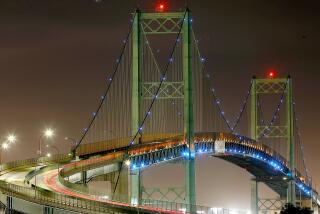They Have Designs on the Future of Our Aging Freeways
- Share via
What if you could drive down a portion of the Long Beach Freeway’s median that is now blocked by concrete columns? Or better, guide your truck down a 10-mile bypass along the bed of the Los Angeles River?
These are just two ideas put forward last week by 40 highway visionaries who met at the Beckman Center in Irvine. It was the first gathering of engineers, road consultants, contractors and transportation planners from around the country to work on rehabilitating the nation’s aging highway system by focusing on an actual freeway. The object of their attentions was the Long Beach Freeway (I-710), which, at age 44, has already surpassed its original life expectancy by 24 years.
“It’s one of the oldest freeways in Southern California, and it’s never undergone a complete reconstruction,” said Doug Failing, chief of design for the Los Angeles County division of Caltrans, which sponsored the event along with the Federal Highway Administration and the Transportation Research Board of the National Research Council. “This is very exciting.”
The idea was to put some of the nation’s best road heads together to come up with innovative ways to rebuild old highways, many of which are 30 to 40 years old but were designed to last only 20.
“These are old folks as far as highways go,” said Neil Hawks, a spokesman for the research board.
What better way to learn about roads than to focus on one in particular? Enter the Long Beach Freeway, which traverses 15.7 miles of Los Angeles County, roughly from downtown Long Beach to just short of the Foothill Freeway in South Pasadena.
The road fixers began last Monday by hearing presentations from federal, state and local officials, as well as representatives of the construction industry, United Parcel Service and the Automobile Club of Southern California.
Tuesday and Wednesday, they divided into small groups to brainstorm about renovating highways in general and the Long Beach Freeway in particular. Thursday, each group presented its findings to the conference.
Among their suggestions:
* Redesign aging bridges using modern materials and techniques that would eliminate center columns. This would free the freeway’s median, providing an extra lane to keep traffic flowing during road reconstruction.
* Build a temporary truck bypass lane along the bottom of the concrete-lined Los Angeles River, which parallels the freeway and is dry during the summer. Diverting trucks off the freeway, the planners reasoned, would also decrease congestion while the builders do their work.
* Close sections of the freeway over weekends and step up construction techniques to quadruple the amount of roadway repaved in that time.
The ideas will be distributed to conference participants and transportation planners nationwide. “Hopefully a number of the concepts can be used,” Caltrans’ Failing said, “and Caltrans is going to look very carefully at using them.”
The state transportation department has applied for funding to rebuild virtually all the state’s highways, including the Long Beach Freeway and many others in Orange County. A funding decision is expected by June, Failing said, with road work at least three years away.
For some conference participants, however, the impact was immediate. One engineer from Missouri, attendees said, called his home office in the middle of a session with some important instructions. “Hold up,” he was overheard to say, “we’re going to do some redesign on those bridges.”
Robert Schuster, senior project manager for Sverdrup Civil Inc., an engineering and architectural firm with offices in Costa Mesa, said the conference was helpful. “In particular, I liked the willingness of Caltrans and the national research board to investigate things that are out-of-the-box--beyond what we normally would do, or even think of doing,” he said.
Hawks said the conference had implications for the future. “This was a step into the unknown, and it turned out very well,” he said. “I don’t think we found a magic bullet, but I think we got a host of ideas that will make life a lot easier for motorists, truckers and highway agencies.”
*
Street Smart appears Mondays in The Times Orange County Edition. Readers are invited to submit comments and questions about traffic, commuting and what makes it difficult to get around in Orange County. Include simple sketches if helpful. Letters may be published in upcoming columns. Please write to David Haldane, c/o Street Smart, The Times Orange County Edition, P.O. Box 2008, Costa Mesa, CA 92626, send faxes to (714) 966-7711 or e-mail him at David.Haldane@la times.com. Include your full name, address and day and evening phone numbers. Letters may be edited, and no anonymous letters will be accepted.
More to Read
Sign up for Essential California
The most important California stories and recommendations in your inbox every morning.
You may occasionally receive promotional content from the Los Angeles Times.













